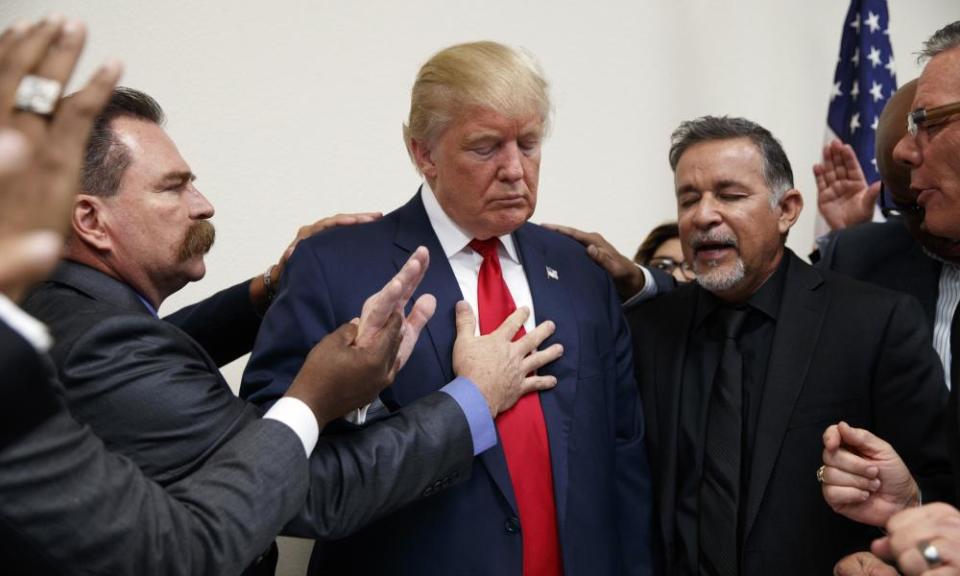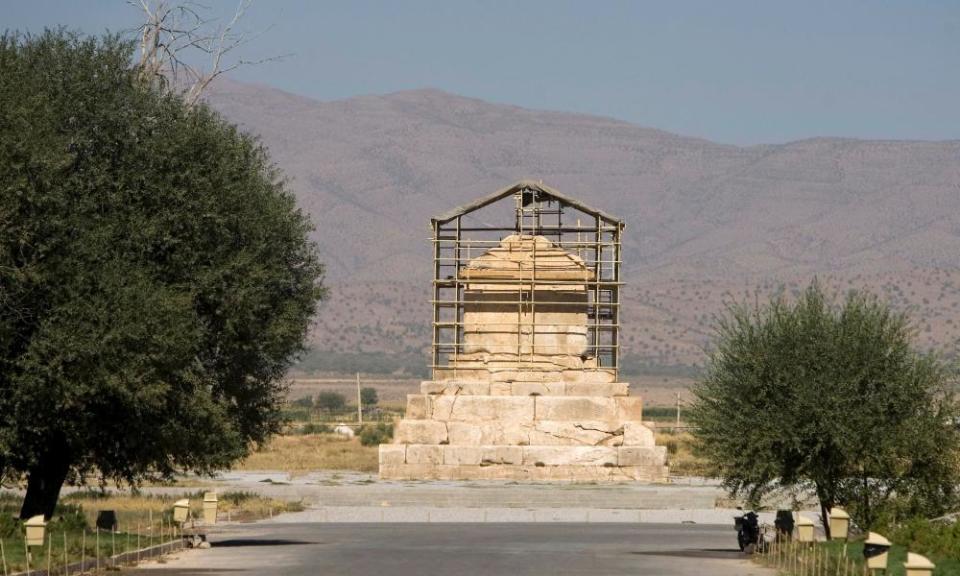'Unparalleled privilege': why white evangelicals see Trump as their savior

Before the end of 2016 there was little in Donald Trump’s life, or frequently offensive political campaign, to suggest that as president he would be hailed as God’s appointee on Earth, be beloved by born-again Christians, or compared to a biblical king.
Yet that is exactly what has happened in the three years since Trump took office, as he has surrounded himself with a God-fearing cabinet and struck up an unlikely but extremely beneficial relationship with white evangelical supporters.
It’s a relationship that, for Trump, has ensured unwavering support from a key voter base and for his religious supporters, seen a conservative takeover of the courts and an assault on reproductive and LGBTQ rights.
It’s also a relationship that is raising concerns about what another four years of Trump governance could achieve when it comes to fulfilling the policy ambitions of his evangelical backers.
“It’s incredibly troubling,” said Rachel Laser, president and CEO of Americans United, a non-partisan organization dedicated to the separation of church and state.
“Trump is conferring unparalleled privilege on one narrow slice of religion,” Laser said. “He confers privilege in exchange for constant loyalty at the ballot box, no matter what he does.”
The unlikely alliance between those nominally following biblical interpretations of right and wrong, and a thrice-married man who has been credibly accused of sexual assault and infamously paid off a pornographic actor, has thrown up a rich – and bizarre – cast of characters.
A sustained effort by influential Christian voices to justify Trump’s personal misdeeds and political cruelty has led to the frequent portrayal of Trump as a flawed vessel for God’s will. In particular, Trump has been compared to King Cyrus, who, according to the Bible, liberated the Jews from Babylonian captivity, despite himself being a Persian ruler.

One of the first to make the Trump-Cyrus connection is Lance Wallnau. Wallnau, a business consultant who styles himself as a doctor – his LinkedIn page credits Phoenix University of Theology as his alma mater, but the university had its 501c3 status revoked by the Internal Revenue Service in 2017 and its campus appears to be a PO Box in Arizona – claims the “the Lord spoke” to him during the election period.
According to Wallnau God said, specifically: “Donald Trump is a wrecking ball to the spirit of political correctness.”
Wallnau is not alone on this. Mike Evans, an evangelical leader who was invited to speak in front of Trump at a White House faith dinner, is also onboard with the Cyrus analogy. He explained the idea to the Christian Broadcasting Network in 2017.
“[Cyrus] was used as an instrument of God for deliverance in the Bible, and God has used this imperfect vessel, this flawed human being like you or I, this imperfect vessel, and he’s using him in an incredible, amazing way to fulfill his plans and purposes,” Evans said.
At a campaign rally in Florida last week to launch a push for evangelical support Trump was introduced on stage by the Miami mega-church pastor Guillermo Maldonado as Cyrus. “Father, we give you the praise and honor and we ask you that he can be the Cyrus to bring reaffirmation, to bring change into this nation, and all the nations of the Earth will say America is the greatest nation of the Earth,” Maldonado said.
Rank-and-file evangelicals have also embraced the imperfect vessel concept, and Wallnau is now selling Trump-Cyrus “prayer coins” – the king is in the background, a brooding profile of Trump is in the foreground – for $45 a coin.
“If you’re a faith community and you make a political deal with the president, and sell your soul, you stretch to come up with a theological justification, and this seems to be the go-to, this idea,” Laser said.
The concept has since gone international, with Israel’s prime minister, Benjamin Netanyahu, making the comparison in March 2018.
Cheered on by these, and other, prominent figures – the televangelist Paula White, who claims Trump has been “raised up by God” and was appointed to lead Trump’s Faith and Opportunity Initiative in November is among them – white evangelical Christians have continued to support Trump.
In return, they have been rewarded with attacks on reproductive rights and the freedoms of LGBTQ people, and the appointment of scores of conservative judges.
They have also watched people with the same evangelical beliefs appointed to key government positions, as Trump has stacked his cabinet with devout Christians, some of whom have been explicit about how their faith influences their approach to government.
“Many of Trump’s political appointees have, as their primary qualification, the fact that they are committed to a very distinct, conservative religious agenda,” said Katherine Stewart, author of an upcoming book The Power Worshippers: Inside the Dangerous Rise of Religious Nationalism.
“Absent the Trump administration, many of them would never have been seen near the halls of power, and so they owe everything to Trump and his people.”

Among them is Mike Pompeo, Trump’s secretary of state, who was criticized in October for promoting his own speech “Being a Christian Leader”, where he opined on how he asks God for direction in his work, on the state department website. In 2015 Pompeo also confirmed he believes in the Rapture, the concept of an end of days event – usually some sort of catastrophe – whereby Jesus Christ will return to Earth and escort qualified believers into heaven.
Other committed evangelicals include Vice-President Mike Pence, who as governor of Indiana signed a law which allowed businesses to refuse service to LGBTQ people, citing religious freedom.
Some of the people Trump has appointed are already making a difference. Ben Carson, who has been in charge of housing and urban development since 2017. Under Carson’s leadership, Laser pointed out, Hud has proposed legislation which would allow federally funded homeless shelters to discriminate against transgender people, on religious grounds.
Meanwhile, the concept of Trump channelling God’s will has gained credence at the highest levels of the US government.
Rick Perry, another evangelical member of Trump’s cabinet who serves as energy secretary, echoed the theory of an imperfect biblical figure in November – albeit choosing different examples from Cyrus.
“God’s used imperfect people all through history. King David wasn’t perfect. Saul wasn’t perfect. Solomon wasn’t perfect,” Perry told Fox News in November, during an interview which was nominally about the impeachment hearing. Perry added that God had chosen Trump for the presidency.
There are signs that the alliance will continue to remain strong. In March 2019 Pew Research found that “white evangelical Protestants” continued to overwhelmingly support Trump, where most other religious groups were as divided as the American people as a whole.
It is that support that Trump, the imperfect vessel, will be counting on in November 2020.

